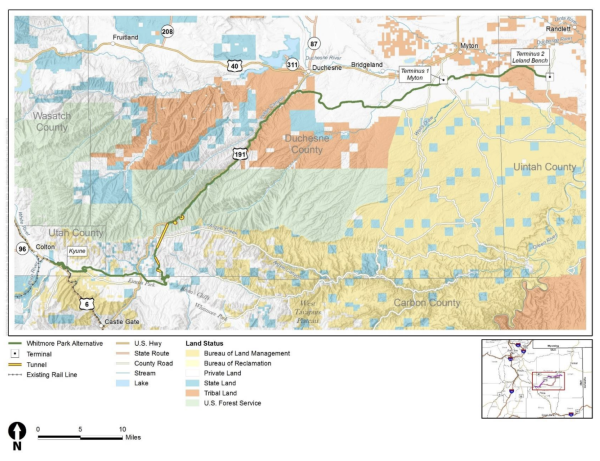U.S. Forest Service pulls plug on approval for Uinta Basin oil-train project opposed by Colorado

A United States Forest Service map shows the route, in green, of the proposed Uinta Basin Railway through a protected roadless area in the Ashley National Forest, shaded in light green, in eastern Utah.
A controversial Utah oil-train proposal opposed by Colorado communities and environmentalists was dealt another blow this week when the U.S. Forest Service withdrew a key permit for the project.
In an announcement published Wednesday, Ashley National Forest Supervisor Susan Eickhoff blocked the issuance of a permit to the Uinta Basin Railway to construct 12 miles of railroad track through a protected area of the national forest in northeast Utah. The stretch of track in question is part of the proposed railway’s 88-mile connection between the oil fields of eastern Utah’s Uinta Basin and the existing national rail network.
The project has drawn fierce opposition from Coloradans. A federal “downline analysis” estimated that 90% of the resulting oil-train traffic — as many as five fully loaded, two-mile-long trains of crude oil tankers per day — would be routed through environmentally sensitive and densely populated areas in Colorado, en route to oil refineries on the Gulf Coast. The oil trains would more than quadruple the amount of hazardous materials being shipped by rail through many Colorado counties.
Colorado’s Eagle County and five environmental groups sued to overturn the Uinta Basin Railway’s approval, and in August 2023 a panel of federal judges ruled that the approval process contained “numerous” and “significant” violations of the National Environmental Policy Act. The ruling vacated portions of the project’s environmental impact statement and ordered the federal Surface Transportation Board to redo its analysis of key environmental risks.
Because the Forest Service’s decision in August 2022 to grant a right-of-way permit to the project was based on that flawed analysis, the agency has withdrawn its decision pending further proceedings at the STB. A map showing the route, in green, of the proposed Uinta Basin Railway through a protected roadless area in the Ashley National Forest, shaded in light green, in eastern Utah. (USFS)
“If the deficiencies are addressed and resubmitted for consideration, the Forest Service may issue a new decision,” Eickhoff wrote in a Jan. 17 letter.
“This is wonderful news for the roadless forest in Utah’s Indian Canyon and the wildlife who call it home,” said Ted Zukoski, senior attorney with the Center for Biological Diversity, one of the groups that sued to block the project. “It’s a victory for the Colorado River and nearby communities that would be threatened by oil train accidents and spills, and for residents of the Gulf Coast, where billions of gallons of oil would be refined. If the oil train’s backers attempt to revive this dangerous scheme, we’ll be there to fight it again.”
In a press release, Democratic U.S. Sen. Michael Bennet of Colorado, who had urged multiple federal agencies to put a stop to the project, applauded the Forest Service’s move.
“A derailment along the headwaters of the Colorado River could have catastrophic effects for Colorado’s communities, water, and environment,” Bennet said. “I’m glad the Forest Service has taken this important step to protect the Colorado River and the tens of millions of people who depend on it.”
Utah state Sen. Ron Winterton, a Republican from Roosevelt and staunch supporter of the railway, told Utah News Dispatch on Thursday that he was disappointed to learn of the permit withdrawal. The process has become “political,” said Winterton, whose district encompasses much of the Uintah Basin where most of Utah’s oil production takes place.
“Colorado is not impacted in the project area,” Winterton said. “It already has a railroad there. Yes we may be adding another train or two through their community but … for the Forest Service to pull those permits when they came out strongly supporting the project, saying it does support the (Biden) administration’s position and now reversed course, I’m disappointed.”
Backers of the railway project include the Seven County Infrastructure Coalition, a group of Utah county governments in the oil-rich Uinta Basin. The coalition’s petition for a rehearing of the case by the U.S. Court of Appeals for the D.C. Circuit was denied in December, though the ruling could still be appealed to the U.S. Supreme Court.
“We’re still looking at options,” Greg Miles, a Duchesne County commissioner and co-chair of the coalition, said during a Jan. 11 public meeting. “We may be making a decision here within the next month.”
Editor’s note 1: Utah News Dispatch’s Kyle Dunphey contributed to this report.
Editor’s note 2: This story first appeared on Colorado Newsline, which is part of States Newsroom, a network of news bureaus supported by grants and a coalition of donors as a 501c(3) public charity. Colorado Newsline maintains editorial independence. Contact Editor Quentin Young for questions: info@coloradonewsline.com. Follow Colorado Newsline on Facebook and Twitter.
Chase Woodruff
Latest posts by Chase Woodruff (see all)
- Colorado-Utah battle over oil trains could wind up tied in U.S. Supreme Court following recusal - December 12, 2024
- Colorado’s Front Range Passenger Rail sales tax vote pushed off until 2026 for planning purposes - May 23, 2024
- Colorado officials cite relentless threats, election lies in wake of SCOTUS ruling on Trump eligibility - March 5, 2024

You must be logged in to post a comment Login